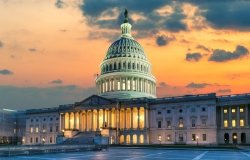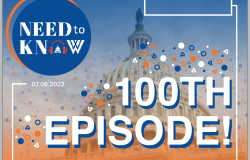Congress, Lobbyists, and the Public Interest
Overview
The perception of lobbyists is quite different inside versus outside the beltway. Those inside the beltway, particularly those on Capitol Hill, view lobbyists largely as allies who provide the information needed to make educated decisions about often very complicated topics. The general American populace, outside the beltway, including much of the media, have a far less benign impression of lobbyists as those who buy votes with campaign contributions.What is the more accurate picture? Do lobbyists serve the public interest, or hinder the democratic process? This Congress Project seminar brought together four panelists with varying perspectives to consider these questions.
Lobbyists play a large role in Rep. David Price's (D-NC) job. He is frequently meeting with representatives from associations, advocacy groups, and corporations on various issues. He added that 90 percent of these office appointments are with his constituents, "Lobbying is heavily constituent oriented."
According to Price, people seeking government research grants are darkening his doorstep more frequently, ready to illustrate for him the human impact of any given bill and for him, this is beneficial. "Lobbying is honorable and of great help to the policy process," Price said. Lobbying provides much needed information and guidance and takes place overwhelmingly with like-minded members of Congress.
To be effective though, Price said that lobbyists must be candid when asked probing questions by members of Congress.
The Power of the Intense Minority
In today's "crowded environment of interests," it is the responsibility of the member to strike a balance. Well organized "intense minorities" can send members into a panic with phone and e-mail campaigns that jam phone lines. But as Price cautioned, "Intensity matters, but surely it is not the majority view." The member retains the responsibility to seek out underrepresented interests, those of disadvantaged groups whom cannot afford a powerful lobbying firm.
Therefore, one of the caveats to lobbying is that these broader, "public interests" are not given ample attention becasue of their lack of representation in Washington.
Robert S. Walker, Chairman and CEO of the Wexler Group, a lobbying firm, and former republican representative from Pennsylvania has been able to see lobbying from several vantage points: Congressional staffer, representative, and lobbyist.
According to Walker, lobbyists help Congressional staff to understand specialized knowledge in a public policy context. He warned however that with the large staffs today, messages that are communicated to staff do not always make it back to the member.
The relationship between lobbyists and members is much more interactive. Walker agreed with Price that lobbyists have a responsibility to give an honest representation of the other side of the story and to answer legislators' probing questions candidly.
"If lobbyists did not exist, we would have to invent them!"
Lobbyists' principal function is to serve as a conduit of information. They are needed to focus and distill the masses of information available on any given issue. The most effective lobbyist will educate the member in the public policy context and will mobilize local interests.
Walker saw room for improvement in the profession however, citing a need for increased professionalism with the establishment of minimal standards and a code of ethics. This would help to recast the profession as directly serving the public interest.
Rick Hall, associate professor of Political Science at the University of Michigan, initially presented the other side of the coin, pointing out that lobbyists are not held in high esteem by the general public. Specifically he described the prevailing theory that Congress peddles to special interest groups to secure campaign contributions. In fact, in recent times, at least a dozen books have been written about this unflattering picture of lobbying.
Rick Hall described two different models of lobbying: the "trading model" and the "persuading model." The trading model is simply the trading of campaign contributions for votes, while in the persuading model, lobbyists provide information to legislators in an attempt to persuade them on a particular issue. Both models focus on changing the legislator's views.
Rick Hall then proposed a third model of his own: the "subsidy model" where lobbyists subsidize the legislative process by helpling legislators fight common causes in a resource scarce environment. Lobbyists provide policy analysis and information that has been put into a public policy context. This model is also based on the prediction that lobbyists tend to lobby their friends—legislators that already support their interests. The result of this subsidizing process is that while votes are not necessarily changed, it does cause legislators to become more active on behalf of an issue.
Hall concluded that to the extent that lobbying helps well-heeled interests, other issues fall by the wayside, a point mentioned earlier by Price.
Jonathan Rauch, senior writer for The National Journal and author of Government's End: Why Washington Stopped Working (1999), pointed out the enormous disconnect between the view of lobbyists inside, versus outside the beltway. Those inside the beltway tend to see the benefits of lobbying, while the general population believes that lobbyists are buying votes.
Rauch's main thesis is that lobbying has created a dynamic situation where special interest groups tend to breed still more interest groups. For every lobbying group with a given agenda, another group is created to counteract the first. Rauch claims that at this point it is near impossible to reverse this trend, but we as a society can manage it better so as to realize the positive effects of lobbying.
Thank you for your interest in this event. Please send any feedback or questions to our Events staff.










